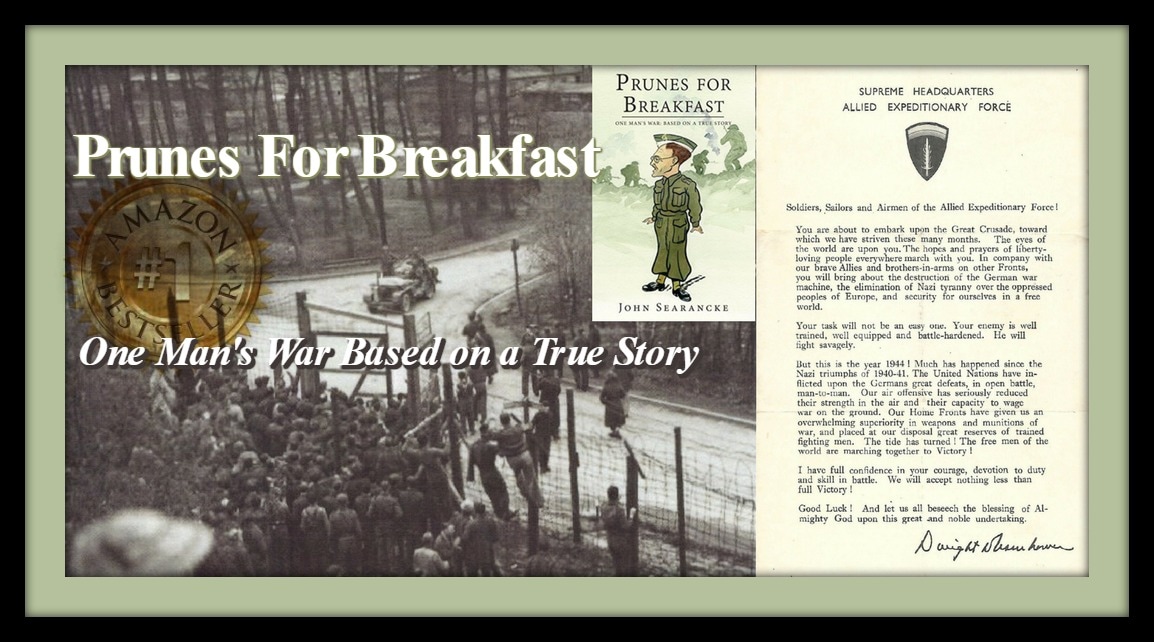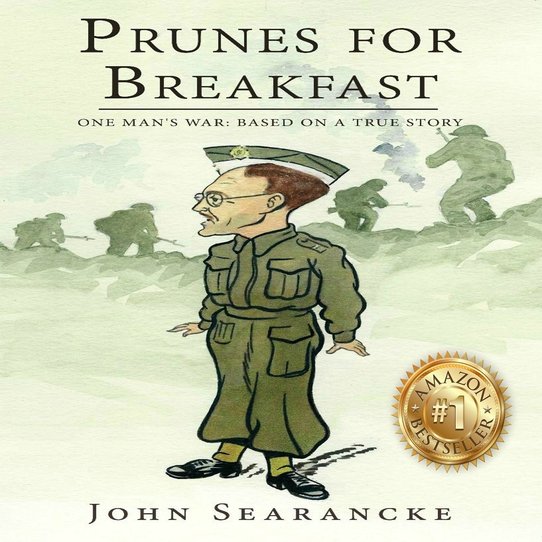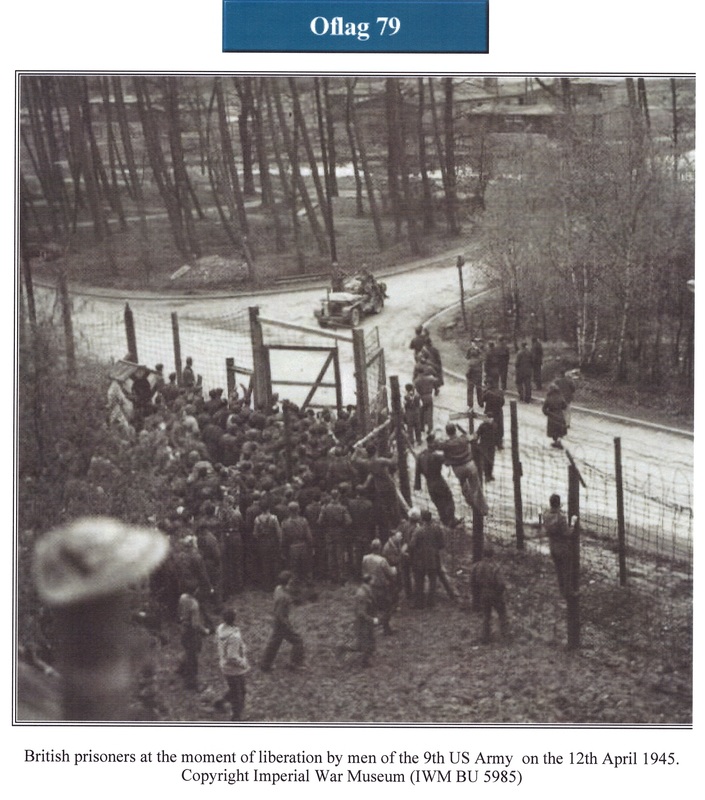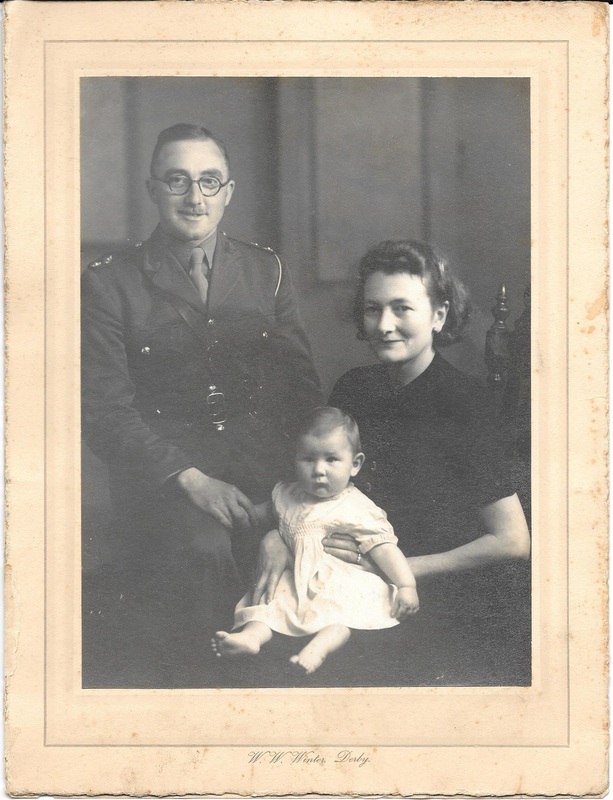Rukia Publishing Book Showcase
Prunes for Breakfast is available on expanded distribution at all good bookstores in ebook and paperback format.
iTunes: http://bit.ly/prunesitunes
Scribd: http://bit.ly/prunesscribd
Kobo: http://bit.ly/koboprunes
Bookbag Review: http://bit.ly/prunesreview
Reader Review: http://bit.ly/prunesJHreview
Radio Interview with John Searancke: http://bit.ly/prunesradint
Get The Audio Book Here> http://bit.ly/Prunes4Breakfast
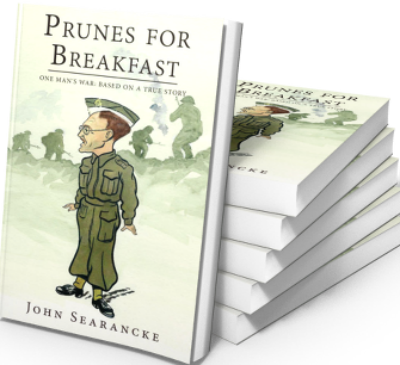
Prunes for Breakfast by John Searancke This is the story of John Searancke's parents, told mostly from the side of his father, Eddie Searancke, from the time of his calling up in early 1940 to his release from a prisoner of war camp in Germany in 1945, thence his return to England to try to pick up the pieces of his old life. Nothing could ever be quite the same afterwards. The letters take readers through five captivating years, telling of the ups and downs, the plots and counterplots, as Eddie rose through the ranks to end his war as a captain, elevated to that rank in the field as his troops faced the formidable might of the SS Panzers. The letters also reveal where his battle came to an abrupt end, in an orchard surrounded by the enemy and captured after a series of bloody skirmishes as the British army spearheaded its way from the beaches of Normandy. The journey as a prisoner across France and Germany in a truck, with comrades dying each day, may be as hard to read as it is to tell, particularly when a new life and new harsh rules had to be learned and rigidly enforced in a prison camp in northern Germany, the final destination. This is written as part memoir, part fictionalised retelling and partly in letter format; John draws together all sources to recreate the five years of war and hardship that the letters span. Keep up to date with Prunes for Breakfast news and events follow on: John Searancke With The English Informer |
Customer Reviews
5.0 out of 5 stars
A fascinating wartime read.
By Mrs BEH Towers on June 10, 2016
I am not normally a lover of war-based books, but I was attracted by the title and decided to read it anyway. I’m so glad I did. For me it is as much a study of social history as it is a story about one man’s experiences in World War 2.
Prunes for Breakfast focuses on the experiences of the author’s father, Eddie, when he signs up to join his local reserve regiment in the 1940s. What immediately sets it apart from many others on the subject is that much of the story is told through letters sent by Eddie to his wife. Letters that were so important at the time for the recipient, and which have been cherished and faithfully preserved.
I was fascinated by his commentary on day-to-day activities as the regiment wait for the call-up, some of which seemed humdrum and therefore challenging in their own way. But it doesn’t last forever. They starkly contrast to the horrors of war, which are then related in a very different way to protect his wife from the harsh reality of the situation. Latterly his capture and incarceration in a prison camp lends yet another dimension to his wartime experiences.
Without doubt I would recommend this book to anyone who has a special interest in World War 2 and the social history that surrounds it. The intimacy of the letters, in particular, gives the reader a direct insight of how one serviceman coped with being apart from his new wife, and latterly child. That, coupled with John Searancke’s excellent, clear writing style, makes this a compelling read
4.0 out of 5 stars
Very interesting about every day life in world war II Britain.
By susann on January 1, 2016
I am glad the author put together the letters from his father to his mother during WWII in Britain along with additional narrative bridging them. It was a wonderful insight into an everyman's experience even though his father was a bit more on the elite side. What I find sad is that the this was the author's journey into getting to know a father that he didn't seem to know or relate to well in his younger years. I think he was very lucky to have access to these letters. I would love to find something like that to understand my father better who was an American stationed in the UK doing intelligence work. His whole career has been a mystery to me as well as his inner feelings so I envy the author that. I was very surprised to see how much the father shared in his letters about the details of his days, his work and even what maybe should have been censored in case there were prying eyes and spies -- where they were, what they were guarding and the build up to D-day. Well worth reading for war buffs!! Thank you to the author for sharing this.
4.0 out of 5 stars
A True Document
By reader on December 26, 2015
The author gives us a wonderful account of his father’s life and times. I’s in the form of a memoir,a and with a judicious use of military historical research and his father’s letters, he gives us a pretty good idea of what it must have been like for most of our fathers and grandfathers during WW II.
Reading the account the reader is shown that for most of the time, the majority of the army didn’t really have anything to do except wait and prepare, and so his father (and mine), like most serving officers, spent their time drilling and practicing until four years later. Then with the Americans on our side we finally had enough muscle to stage the Normandy landings in the last year.
The book is compilation of the father’s letters to his wife and skilfully told narrative, and through this, we follow his life on various army bases. More than anything else, the account is an good example of quintessentially English stoicism. There is hardly a whisper of complaint, and certainly no Latin-like romantic declaration of love as our hero sucks his pipe and writes to his beloved at home. Occasionally an affectionate word is written, or a caring enquiry is made as to her well-being or the health of his son, but emotion barely breaks the surface as he details the minutiae of daily camp life. (One pictures Leslie Howard square jawed and pipe clamped firmly between his teeth in the flickering light of a kerosene lamp, penning a stoic missive.)
Eventually the Normandy landings take place, and once in France, he doggedly writes home despite the fighting , but again, hardly a mention is made of the horrors – although at one point he does let on that things had recently been ”not too pleasant at all” and he’d “lost a few men”. (We are indeed a remarkable people!)
Then within about a month of the Normandy landings, he is taken prisoner to spend the last few months of the war in a POW ‘Oflag’, where again he continues to write home, and this gives a very good insight into the frustration and the drudgery of camp life before he is repatriated at the end of the war.
It’s a remarkable achievement to have created a book out of it, and I’m very glad I read it – a true document of its time.
5 stars
INCREDIBLE MEMOIRS
By ELIZABETH HARDING on 14 December 2015
Such an entertaining book for youngsters who are learning about the Second World War, for those of us who were fortunate enough to be born just after the last shots had been fired over Europe and for those who actually experienced life in wartime. I fear "educational" is perhaps rather too starchy a word to describe this brilliant book, but I have certainly learned so much more about the war and I hope that others will experience the same gamut of emotions I felt right to the last "bowl of prunes!" Please read about John's father's harrowing and amusing experiences in the 1940's.
5 Stars
Eloquent, excellent writing that grips your attention
By Rukia The Reader on Novemeber 20, 2015
This is an eloquent demonstration of excellent writing which poignantly tells a touching story set in wartime, retold using the content of personal letters from the authors father. An emotion filled story of love and war unfolds and as a reader you are transported into the time and place by superb descriptions and thoughtful use of vocabulary. It was refreshing to read a book relating to this period in time that did not make assumptions about the reader and subsequently educated a novice in wartime terminology in an non-patronising delivery of military terms. The descriptive narrative was carefully crafted and it is obvious the author has taken time, research and a great deal of thought piecing this story together, Highly recommended and as it's not a typical war story it will appeal to a wide range of readers.
5 Stars
Exceptional. An outstanding achievement.
By Julie Haigh on November 11, 2015
Format: Kindle Edition
Wow! For those of you who don't normally read prologues, (I always read them), you need to read this one! There’s so much information, it makes you eager to get into the book and is emotional in parts. I love the diary and letter formats-I love the authenticity of it (how he's left the letters as was, even if there were any slight errors). What a beginning! (And that's just the prologue!!!) It’s very skilfully written and I love the author’s word choices; languishing/trundled etc. What a valuable piece of history-thank heaven people write their experiences down and they're not lost forever. This is such an interesting, informative and enthralling work. I was lucky enough to receive a complimentary paperback copy from the publisher. (I later bought the kindle edition as well from amazon.) This is a quality presentation with a matt cover which has a lovely feel to it. The paper thickness and quality again is immaculate. This looks and feels a real treat to read. I love my Kindle Fires but it's a bit of luxury to have a quality print book such as this in my hands for a change. A sparkling achievement, a marvellous tribute to his father and a family memento to hand down. I thought it was a great idea to include the short section on military references; it’s conveniently placed near the beginning so you can easily flick back there if you need to. It's just info like what's a Battalion/Division etc. (useful-as I didn't know). It might not be needed by some but it's there if you do. It would be easy to keep clicking back here in the kindle edition also. The book chronicles the author’s father's story right from his birth in 1912, following his own father into the family building business before being suddenly uprooted to go into the Army at the age of 27. This was SO good-and certainly not just a man's book! (If that's what you're thinking!) There's something for everyone and I found it really very moving. I think he's done a great job of translating his father's letters to make this flow into book form-I could actually picture this as a TV miniseries! Nostalgia-Ind Coope brewery-I'd not heard that name for a while-also, my own granddad must have taken a similar journey into the Army for the first world war-so this read was affecting me, I was making connections and feeling emotions about what it must have been like for my own grandparents. I found this exceptionally interesting. My partner's dad was in the Army, also at Leicester; I kept discussing with him about things in the book, there were lots of the places he knew etc. I didn't just speed through this, I savoured it, looked up things, and asked more about things. John Searancke captures the time perfectly. There's also those little threads of intrigue running through-obviously, there are things the author will never know about his parents, he's cleverly put this together through letters and some things are missing-this makes it all the more interesting. It was real ‘edge of your seat stuff’ vivid portrayal at the closing chapters with the mentions of the terrible conditions and the men dying around them. In the midst of all this, I even chuckled occasionally at some of his father's expressions. A truly immaculate book. Exceptional. Outstanding.
5 Stars
Wonderful read!
By To be Frank... on October 22, 2015
Format: Kindle Edition
Torn from his cosy well-to-do life as a (very) young company director in Burton on Trent, with its all-pervading smell of roasted hops from the breweries, Private Edward Searancke (the author’s father) is dumped from the back of a removals van into a far less cosy life in the British army. There’s a war on, Hitler is at the gate, and Edward is determined to do his duty – even if it means endless square bashing (torture to his fallen arches), separation from his new bride Elizabeth, and nowhere to park his golf clubs. Yet it is through a combination of golf and grit that he rises rapidly up through the ranks to become a captain, one of the brave many who stormed the beaches at Normandy in 1944.
The skill of this marvellous book is the combination of real-life letters, written to and from ‘Eddie’ and Elizabeth, and straight ‘imagined’ narrative as meticulously crafted by their son, John (aka “JE”). The frustration of the two lovers, as Eddie is shunted from pillar to post, from the Isle of Man to St Albans, from Ireland to Kent, and finally to France is brilliantly evoked: what marriage could have had a harder start, when every time they try to meet, a last minute extra duty or a politically important game of golf (I laughed at this, Elizabeth didn’t!) manages to keep them apart. I scanned the letters a few times to work out how they managed to conceive young John!
I also scratched my head over where the Prunes for Breakfast of the title might be – halfway through the book and not a prune in sight – but then Eddie gets captured by the Nazis and banged up in a POW holding camp for officers. What’s for breakfast? Oh yes, it’s prunes, and Eddie becomes a very regular soldier indeed. How glad, however, he is to exchange this meagre repast for steak and chips upon his release by the Yanks – he hasn’t seen a chip in years!
At times hilarious, at others a stern reminder of how Britain kept the great in Great Britain, this is not just the story of how an ordinary man performed extraordinary things in times of war. It is a paean to the virtues of hope, courage and the love of two people whose pens were mightier than the sword. Kudos, John, for interpreting their love and penmanship so beautifully – this is a wonderful read.
A fascinating wartime read.
By Mrs BEH Towers on June 10, 2016
I am not normally a lover of war-based books, but I was attracted by the title and decided to read it anyway. I’m so glad I did. For me it is as much a study of social history as it is a story about one man’s experiences in World War 2.
Prunes for Breakfast focuses on the experiences of the author’s father, Eddie, when he signs up to join his local reserve regiment in the 1940s. What immediately sets it apart from many others on the subject is that much of the story is told through letters sent by Eddie to his wife. Letters that were so important at the time for the recipient, and which have been cherished and faithfully preserved.
I was fascinated by his commentary on day-to-day activities as the regiment wait for the call-up, some of which seemed humdrum and therefore challenging in their own way. But it doesn’t last forever. They starkly contrast to the horrors of war, which are then related in a very different way to protect his wife from the harsh reality of the situation. Latterly his capture and incarceration in a prison camp lends yet another dimension to his wartime experiences.
Without doubt I would recommend this book to anyone who has a special interest in World War 2 and the social history that surrounds it. The intimacy of the letters, in particular, gives the reader a direct insight of how one serviceman coped with being apart from his new wife, and latterly child. That, coupled with John Searancke’s excellent, clear writing style, makes this a compelling read
4.0 out of 5 stars
Very interesting about every day life in world war II Britain.
By susann on January 1, 2016
I am glad the author put together the letters from his father to his mother during WWII in Britain along with additional narrative bridging them. It was a wonderful insight into an everyman's experience even though his father was a bit more on the elite side. What I find sad is that the this was the author's journey into getting to know a father that he didn't seem to know or relate to well in his younger years. I think he was very lucky to have access to these letters. I would love to find something like that to understand my father better who was an American stationed in the UK doing intelligence work. His whole career has been a mystery to me as well as his inner feelings so I envy the author that. I was very surprised to see how much the father shared in his letters about the details of his days, his work and even what maybe should have been censored in case there were prying eyes and spies -- where they were, what they were guarding and the build up to D-day. Well worth reading for war buffs!! Thank you to the author for sharing this.
4.0 out of 5 stars
A True Document
By reader on December 26, 2015
The author gives us a wonderful account of his father’s life and times. I’s in the form of a memoir,a and with a judicious use of military historical research and his father’s letters, he gives us a pretty good idea of what it must have been like for most of our fathers and grandfathers during WW II.
Reading the account the reader is shown that for most of the time, the majority of the army didn’t really have anything to do except wait and prepare, and so his father (and mine), like most serving officers, spent their time drilling and practicing until four years later. Then with the Americans on our side we finally had enough muscle to stage the Normandy landings in the last year.
The book is compilation of the father’s letters to his wife and skilfully told narrative, and through this, we follow his life on various army bases. More than anything else, the account is an good example of quintessentially English stoicism. There is hardly a whisper of complaint, and certainly no Latin-like romantic declaration of love as our hero sucks his pipe and writes to his beloved at home. Occasionally an affectionate word is written, or a caring enquiry is made as to her well-being or the health of his son, but emotion barely breaks the surface as he details the minutiae of daily camp life. (One pictures Leslie Howard square jawed and pipe clamped firmly between his teeth in the flickering light of a kerosene lamp, penning a stoic missive.)
Eventually the Normandy landings take place, and once in France, he doggedly writes home despite the fighting , but again, hardly a mention is made of the horrors – although at one point he does let on that things had recently been ”not too pleasant at all” and he’d “lost a few men”. (We are indeed a remarkable people!)
Then within about a month of the Normandy landings, he is taken prisoner to spend the last few months of the war in a POW ‘Oflag’, where again he continues to write home, and this gives a very good insight into the frustration and the drudgery of camp life before he is repatriated at the end of the war.
It’s a remarkable achievement to have created a book out of it, and I’m very glad I read it – a true document of its time.
5 stars
INCREDIBLE MEMOIRS
By ELIZABETH HARDING on 14 December 2015
Such an entertaining book for youngsters who are learning about the Second World War, for those of us who were fortunate enough to be born just after the last shots had been fired over Europe and for those who actually experienced life in wartime. I fear "educational" is perhaps rather too starchy a word to describe this brilliant book, but I have certainly learned so much more about the war and I hope that others will experience the same gamut of emotions I felt right to the last "bowl of prunes!" Please read about John's father's harrowing and amusing experiences in the 1940's.
5 Stars
Eloquent, excellent writing that grips your attention
By Rukia The Reader on Novemeber 20, 2015
This is an eloquent demonstration of excellent writing which poignantly tells a touching story set in wartime, retold using the content of personal letters from the authors father. An emotion filled story of love and war unfolds and as a reader you are transported into the time and place by superb descriptions and thoughtful use of vocabulary. It was refreshing to read a book relating to this period in time that did not make assumptions about the reader and subsequently educated a novice in wartime terminology in an non-patronising delivery of military terms. The descriptive narrative was carefully crafted and it is obvious the author has taken time, research and a great deal of thought piecing this story together, Highly recommended and as it's not a typical war story it will appeal to a wide range of readers.
5 Stars
Exceptional. An outstanding achievement.
By Julie Haigh on November 11, 2015
Format: Kindle Edition
Wow! For those of you who don't normally read prologues, (I always read them), you need to read this one! There’s so much information, it makes you eager to get into the book and is emotional in parts. I love the diary and letter formats-I love the authenticity of it (how he's left the letters as was, even if there were any slight errors). What a beginning! (And that's just the prologue!!!) It’s very skilfully written and I love the author’s word choices; languishing/trundled etc. What a valuable piece of history-thank heaven people write their experiences down and they're not lost forever. This is such an interesting, informative and enthralling work. I was lucky enough to receive a complimentary paperback copy from the publisher. (I later bought the kindle edition as well from amazon.) This is a quality presentation with a matt cover which has a lovely feel to it. The paper thickness and quality again is immaculate. This looks and feels a real treat to read. I love my Kindle Fires but it's a bit of luxury to have a quality print book such as this in my hands for a change. A sparkling achievement, a marvellous tribute to his father and a family memento to hand down. I thought it was a great idea to include the short section on military references; it’s conveniently placed near the beginning so you can easily flick back there if you need to. It's just info like what's a Battalion/Division etc. (useful-as I didn't know). It might not be needed by some but it's there if you do. It would be easy to keep clicking back here in the kindle edition also. The book chronicles the author’s father's story right from his birth in 1912, following his own father into the family building business before being suddenly uprooted to go into the Army at the age of 27. This was SO good-and certainly not just a man's book! (If that's what you're thinking!) There's something for everyone and I found it really very moving. I think he's done a great job of translating his father's letters to make this flow into book form-I could actually picture this as a TV miniseries! Nostalgia-Ind Coope brewery-I'd not heard that name for a while-also, my own granddad must have taken a similar journey into the Army for the first world war-so this read was affecting me, I was making connections and feeling emotions about what it must have been like for my own grandparents. I found this exceptionally interesting. My partner's dad was in the Army, also at Leicester; I kept discussing with him about things in the book, there were lots of the places he knew etc. I didn't just speed through this, I savoured it, looked up things, and asked more about things. John Searancke captures the time perfectly. There's also those little threads of intrigue running through-obviously, there are things the author will never know about his parents, he's cleverly put this together through letters and some things are missing-this makes it all the more interesting. It was real ‘edge of your seat stuff’ vivid portrayal at the closing chapters with the mentions of the terrible conditions and the men dying around them. In the midst of all this, I even chuckled occasionally at some of his father's expressions. A truly immaculate book. Exceptional. Outstanding.
5 Stars
Wonderful read!
By To be Frank... on October 22, 2015
Format: Kindle Edition
Torn from his cosy well-to-do life as a (very) young company director in Burton on Trent, with its all-pervading smell of roasted hops from the breweries, Private Edward Searancke (the author’s father) is dumped from the back of a removals van into a far less cosy life in the British army. There’s a war on, Hitler is at the gate, and Edward is determined to do his duty – even if it means endless square bashing (torture to his fallen arches), separation from his new bride Elizabeth, and nowhere to park his golf clubs. Yet it is through a combination of golf and grit that he rises rapidly up through the ranks to become a captain, one of the brave many who stormed the beaches at Normandy in 1944.
The skill of this marvellous book is the combination of real-life letters, written to and from ‘Eddie’ and Elizabeth, and straight ‘imagined’ narrative as meticulously crafted by their son, John (aka “JE”). The frustration of the two lovers, as Eddie is shunted from pillar to post, from the Isle of Man to St Albans, from Ireland to Kent, and finally to France is brilliantly evoked: what marriage could have had a harder start, when every time they try to meet, a last minute extra duty or a politically important game of golf (I laughed at this, Elizabeth didn’t!) manages to keep them apart. I scanned the letters a few times to work out how they managed to conceive young John!
I also scratched my head over where the Prunes for Breakfast of the title might be – halfway through the book and not a prune in sight – but then Eddie gets captured by the Nazis and banged up in a POW holding camp for officers. What’s for breakfast? Oh yes, it’s prunes, and Eddie becomes a very regular soldier indeed. How glad, however, he is to exchange this meagre repast for steak and chips upon his release by the Yanks – he hasn’t seen a chip in years!
At times hilarious, at others a stern reminder of how Britain kept the great in Great Britain, this is not just the story of how an ordinary man performed extraordinary things in times of war. It is a paean to the virtues of hope, courage and the love of two people whose pens were mightier than the sword. Kudos, John, for interpreting their love and penmanship so beautifully – this is a wonderful read.
